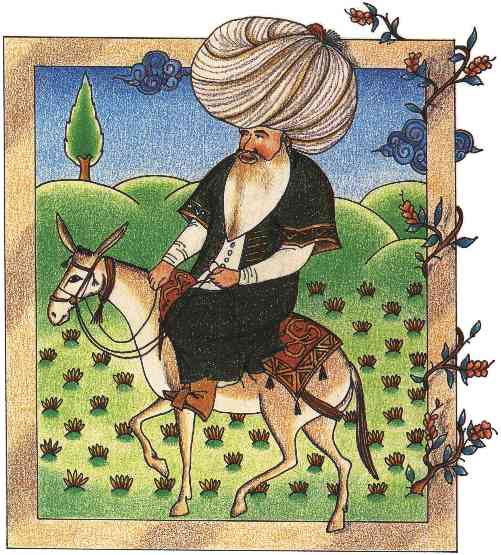
A brief look at the life of Nasreddin Hodja, who was a Turkish satirist and he is thought to have lived in the 13th century, during the Anatolian Seljuk period.
Nasreddin Hodja was born in 1208 in the village of Hortu, in the town of Cishisar, Eskisehir. His father’s name was Abdullah, who was a village imam, and his mother’s name was Sıdıka. The real name of Nasreddin was Ahi Evren.
Hodja Nasreddin started his education in Hortu, then came to Konya to study fiqh (Human understanding of the divine Islamic law as revealed in the Quran and the Sunnah). Here he became a student of the most famous Islamic scholar of his time Seyyid Mahmut Fani. Then he worked as a teacher in Akşehir town which was a part of Konya. Nasreddin got married in Aksehir and had children here. In 1243, when the Seljuks were defeated by the Mongols in the Kösedağ War, they came under the rule of the Mongols and the people had troubled times. It is estimated that the anecdotes about Timur are actually about Timur’s ancestors. Nasreddin Hodja died in Akşehir in 1284. (As it is claimed in another source, he died fighting against the Mongols in 1261, and later his humorous stories were spread by his students) Of course, this information has not been proven. Nasreddin Hodja and his anecdotes have been adopted under different names in many countries.
We have always known Nasreddin Hodja with his beautiful stories that show people’s selfish points of view in a more selfish way. Nasreddin Hodja jokes/stories are mostly quite short. Also, as I read the stories, many of them may seem meaningless in today’s conditions, but I think that they could be quite meaningful in the 1200s. Who knows the value judgments of that time, what was it like to be a peasant in Konya for about 850 years ago? I conclude by interpreting that the purpose should not be to laugh but to think while reading the stories/anecdotes of Nasreddin Hodja.
Examples of Nasreddin Hodja Anecdotes
Once Nasreddin was invited to deliver a sermon. When he got on the pulpit, he asked, Do you know what I am going to say? The audience replied “no”, so he announced, I have no desire to speak to people who don’t even know what I will be talking about! and left.
The people felt embarrassed and called him back again the next day. This time, when he asked the same question, the people replied yes. So Nasreddin said, Well since you already know what I am going to say, I won’t waste any more of your time! and left.
Now the people were really perplexed. They decided to try one more time and once again invited the Mulla to speak the following week. Once again he asked the same question – Do you know what I am going to say? Now the people were prepared and so half of them answered “yes” while the other half replied “no”. So Nasreddin said Let the half who know what I am going to say, tell it to the half who don’t and left. *
Nasreddin Hodja Anecdotes Nasreddin Hodja Lessons Nasreddin Hodja Anecdotes